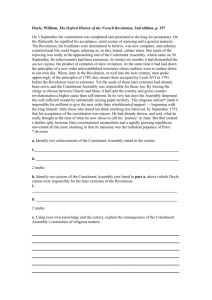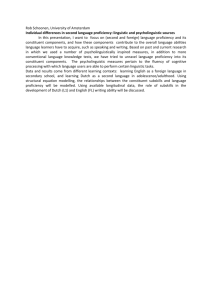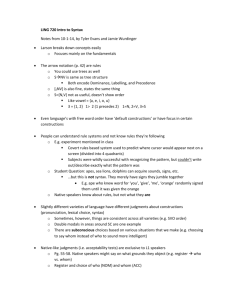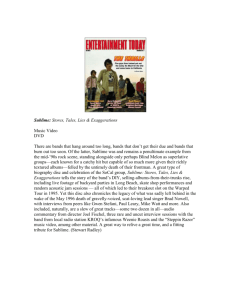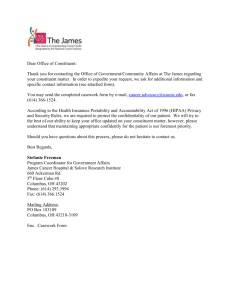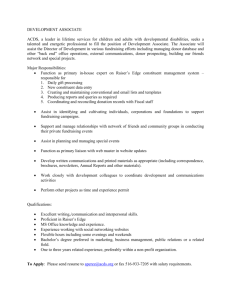Answers to exercises: Chapter 2
advertisement
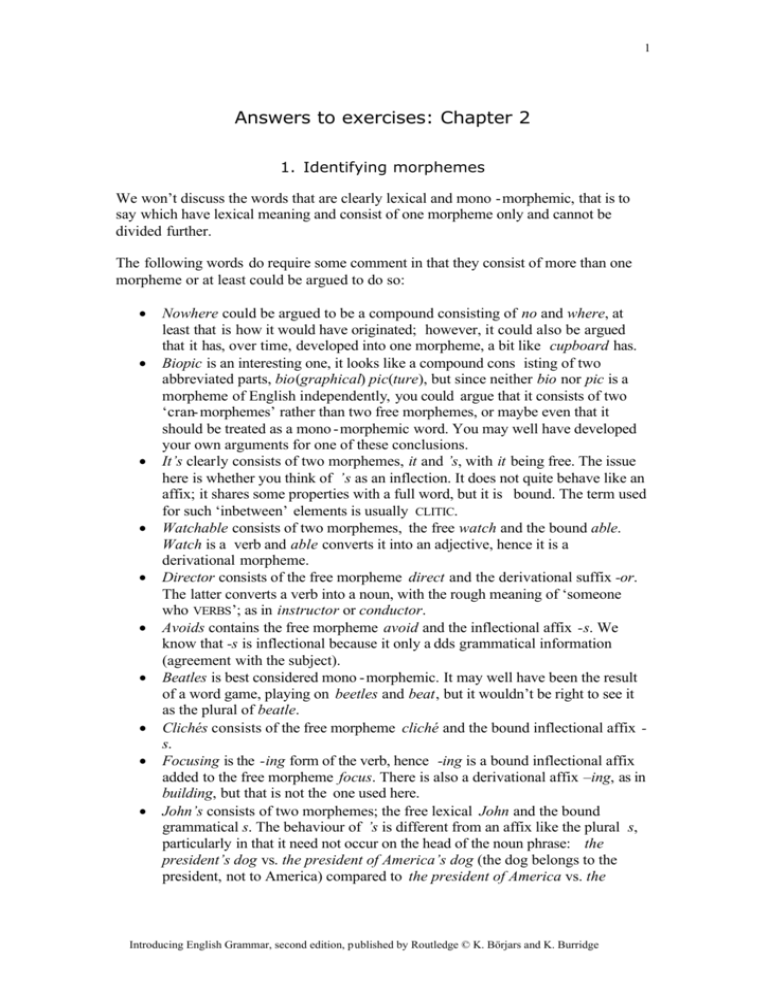
1 Answers to exercises: Chapter 2 1. Identifying morphemes We won’t discuss the words that are clearly lexical and mono - morphemic, that is to say which have lexical meaning and consist of one morpheme only and cannot be divided further. The following words do require some comment in that they consist of more than one morpheme or at least could be argued to do so: • • • • • • • • • • Nowhere could be argued to be a compound consisting of no and where, at least that is how it would have originated; however, it could also be argued that it has, over time, developed into one morpheme, a bit like cupboard has. Biopic is an interesting one, it looks like a compound cons isting of two abbreviated parts, bio(graphical) pic(ture), but since neither bio nor pic is a morpheme of English independently, you could argue that it consists of two ‘cran- morphemes’ rather than two free morphemes, or maybe even that it should be treated as a mono - morphemic word. You may well have developed your own arguments for one of these conclusions. It’s clearly consists of two morphemes, it and ’s, with it being free. The issue here is whether you think of ’s as an inflection. It does not quite behave like an affix; it shares some properties with a full word, but it is bound. The term used for such ‘inbetween’ elements is usually CLITIC. Watchable consists of two morphemes, the free watch and the bound able. Watch is a verb and able converts it into an adjective, hence it is a derivational morpheme. Director consists of the free morpheme direct and the derivational suffix -or. The latter converts a verb into a noun, with the rough meaning of ‘someone who VERBS’; as in instructor or conductor. Avoids contains the free morpheme avoid and the inflectional affix -s. We know that -s is inflectional because it only a dds grammatical information (agreement with the subject). Beatles is best considered mono - morphemic. It may well have been the result of a word game, playing on beetles and beat, but it wouldn’t be right to see it as the plural of beatle. Clichés consists of the free morpheme cliché and the bound inflectional affix s. Focusing is the -ing form of the verb, hence -ing is a bound inflectional affix added to the free morpheme focus. There is also a derivational affix –ing, as in building, but that is not the one used here. John’s consists of two morphemes; the free lexical John and the bound grammatical s. The behaviour of ’s is different from an affix like the plural s, particularly in that it need not occur on the head of the noun phrase: the president’s dog vs. the president of America’s dog (the dog belongs to the president, not to America) compared to the president of America vs. the Introducing English Grammar, second edition, published by Routledge © K. Börjars and K. Burridge 2 • • • • presidents of America. Hence ’s tends also to be called a clitic, just like the ’s of it’s. Years consists of the free lexi cal morpheme year and the inflectional affix s. As far as meaning goes, left consists of two parts; LEAVE and PAST TENSE, much like departed does, but we cannot separate the two parts in left. Such units that express two meanings are often referred to as PORTMANTEAUS. Became is also an example of a portmanteau. There are a large number of free grammatical morphemes in the text: but, a, of, and, the and that. The pronouns, like we and he, can be argued to be grammatical. The category of preposition is in between lexical and grammatical in some ways. Though it is most commonly listed as a lexical category, as we have done in our book, there are some prepositions, like of and by in this text, that seem to have a grammatical role in that there is no choice betw een them and any other preposition – they are forced by the environment. All morphemes we have described as affixes here are suffixes. This is quite typical for English; inflectional affixes are always suffixes, but there are some derivational prefixes. 2. Determining constituents If extremely silly can be shown to be a constituent of He always tells extremely silly jokes (and if you apply the tests, we think you will find it can), then extremely silly jokes could still be a constituent. Constituents exist at different levels; two words may form a constituent at the lowest level, but then that constituent may combine with some other constituent. This is i n fact what happens here; extremely and silly forms one constituent and then that constituent, extremely silly, combines with jokes to form a constituent at the next level up. Once we have established that extremely silly is a constituent, silly jokes cannot be a constituent since at the lowest level silly has already combined with extremely. 3. Determining constituents When you apply constituent tests, it is important that you apply the tests to the string you are considering and only to the string you are considering. You need to watch this especially when the result is an ungrammatical sentence, possibly indicating that the string is not a constituent, because as a native speaker you won’t really like writing down an obviously ungrammatical sentence and you might accidentally change a little more than you should. When the resulting test is ungrammatical, remember that it is important to ask why that might be. (a) The Telegraph called [David Beckham's new beard] the most memorable part of England's 3-0 win over Belarus. Substitution Introducing English Grammar, second edition, published by Routledge © K. Börjars and K. Burridge 3 The Telegraph called it the most memorable part of England's 3 -0 win over Belarus. Sentence fragment — What did The Telegraph call the most memorable part of England's 3 -0 win over Belarus? — David Beckham's new beard. Movement It was David Beckham's new beard that The Telegraph called the most memorable part of England's 3-0 win over Belarus. Co-ordination The Telegraph called David Beckham's new beard and Rooney’s goals the most memorable parts of England's 3-0 win over Belarus. Reduction *The Telegraph called beard the most memorable part of England's 3 -0 win over Belarus. Omission *The Telegraph called the most memorable part of England's 3 -0 win over Belarus. We know that reduction will not work if more than one part of the string is obligatory and that omission will not work if the constituent as a whole is obligatory. Beard is a single count noun and we know that such nouns need to occur with something that functions as a determiner, such as the or, in this case, David Beckham’s. Similarly, this use of the verb call involves two complements, an object and an object comple ment, and what we have done here is delete the object. We can conclude, then, that David Beckham's new beard is a constituent of The Telegraph called David Beckham's new beard the most memorable part of England's 3-0 win over Belarus. All but two constituent tests work, and the two that lead to ungrammatical sentences can be assumed to do so because we delete obligatory parts. You may have used David rather than beard for the substitution test and therefore have ended up with a grammatical sentence, but g enerally with the substitution test, you aim to keep the core meaning – you keep the head of the phrase in. You might have marked the sentence resulting from omission down as grammatical, on a par with sentences like He called ‘don’t go there’ or He called his sister in Burnley, but note that this is a different meaning of call. (b) Giggs scored a truly [sublime goal] . Substitution *Giggs scored a truly it. Sentence fragment — *What did Giggs score a truly? — Sublime goal. Movement *It was sublime goal that Giggs scored a truly. Co-ordination Giggs scored a truly sublime goal and crucial point. Reduction Introducing English Grammar, second edition, published by Routledge © K. Börjars and K. Burridge 4 *Giggs scored a truly goal / a truly sublime. Omission *Giggs scored a truly. It does not look like sublime goal is a constituent of this sentence. The only test that gives a grammatical sentence is co -ordination, but note that since we have co ordinated crucial point with only sublime goal, the sentence should mean Giggs scored a truly sublime goal and a truly crucial point. It is difficult to establis h whether this is really how we read the sentence or whether we read it as a truly sublime goal and a crucial point. Now, if sublime does not form a constituent with goal in this sentence, it may combine with truly at this level. Let’s test truly sublime and see whether this is true. Substitution Giggs scored a gorgeous goal. Sentence fragment — What kind of goal did Giggs score ? — Truly sublime. Movement *It was truly sublime that Giggs scored a goal. Co-ordination Giggs scored a truly sublime and absolutely crucial goal. Reduction Giggs scored a sublime goal. Omission Giggs scored a goal. This was more successful. Movement leads to an ungrammatical sentence, but we have said that movement does not work if a constituent is nested inside a noun phrase and this is the explanation for this ungrammaticality. We can conclude then that sublime does not form a constituent with goal but with truly in this sentence. Truly sublime, in turn, does form a constituent with goal at the next level. (c) Alf Ramsey gave [Colin Bell his England debut] against Sweden at Wembley in May 1968. Substitution *Alf Ramsey gave it / him against Sweden at Wembley in May 1968. Sentence fragment — ??What did Alf Ramsey give against Sweden at Wembley in May 1968? — ??Colin Bell his England debut. Movement *It was Colin Bell his England debut that Alf Ramsey gave against Sweden at Wembley in May 1968. Co-ordination Alf Ramsey gave Colin Bell his England debut and Bobby Moore the captaincy against Sweden at Wembley in May 1968. Reduction *Alf Ramsey gave Bell / debut against Sweden at Wembley in May 1968. Introducing English Grammar, second edition, published by Routledge © K. Börjars and K. Burridge 5 Omission *Alf Ramsey gave against Sweden at Wembley in May 1968. Only one of the tests works and a central test like substitution does not give a grammatical sentence. We can conclude, then, that Colin Bell his England debut is not a constituent of Alf Ramsey gave Colin Bell his England debut against Sweden at Wembley in May 1968. In fact Colin Bell is a constituent, as is his England debut. Together with gave, these two constituents form one large constituent gave Colin Bell his England debut. (d) The objective is to hit [the goal keeper with the ball]. This sentence is ambiguous in that it can mean that the objective is to hit the goal keeper who has the ball, or that you use the b all to hit the goal keeper with. Let’s apply the constituency tests and see if both meanings are preserved. Substitution The objective is to hit him. Sentence fragment — Who is it the objective to hit? — The goal keeper with the ball. Movement It is the goal keeper with the ball that it is the objective to hit. Co-ordination The objective is to hit the goal keeper with the ball and the striker with red boots. Reduction *The objective is to hit keeper. Omission *The objective is to hit. It is clear from t hese tests that the goal keeper with the ball is a constituent of The objective is to hit the goal keeper with the ball. Only reduction and omission give ungrammatical sentences. Since keeper is a singular count noun, it cannot occur without a determiner and hit is a transitive verb which requires a complement. However, when we successfully apply the constituent tests, we are left with the interpretation of the sentence in which the goal keeper has the ball. This means that we can conclude that the ambiguity in this sentence is structural in nature: the two meanings have different structures. 4. Structural ambiguity (a) British Left Waffles On Falkland Islands. One meaning is that the political left in Britain speaks incoherently about the Falkland Islands (let’s call this Meaning 1). The other is that British people leave some waffles on the Falkland Islands (Meaning 2). There is clearly a lexical ambiguity in waffles between a verb which means ‘speak incoherently’ and a noun that refers to something a bit similar to a pancake. However, it seems likely that there is also a structural Introducing English Grammar, second edition, published by Routledge © K. Börjars and K. Burridge 6 ambiguity. The difference would seem to lie in how left forms a constituent. In one case it is British Left and in the other left waffles. If we apply some constituency tests to British Left, we ought to get only Meaning 1 , and if we apply them to left waffles we get Meaning 2. The sentences will sound a little bare like this, without articles, but that is the way headlines are often made. Let’s try British Left first (you can apply all the tests, we have just selected some of our favourites here): Substitution He waffles on Falkland Islands. Sentence fragment — Who waffles on Falkland Islands? — British Left. Movement It is (the) British Left who waffle on (the) Falkland Islands. This shows that British Left is a constituent, but only with Meaning 1. Now left waffles: Substitution British land on Falkland Islands. Sentence fragment — What did (the) British do on (the) Falkland Islands? — Left waffles. Movement It was leave waffles that (the) British did on (the) Falkland Islands. So, we can show that in the same sentence left waffles is a constituent, but then we only get Meaning 2. This is then a structural ambiguity. (b) Clinton Wins on Budget, But More Lies Ahead. The ambiguity can be found in more lies ahead. It can either mean that there are more untruths ahead (Meaning 1) or that there are more battles like the one over budget ahead (Meaning 2). Again, there is an ambiguity in the meaning of one word, lies as in the plural of the noun lie (Meaning 1) or the third person singular present tense form of the verb lie (Meaning 2). It is difficult to apply the constituent tests to the sentence as it stands, since the ‘headlinese’ has left the verb out in Meaning 1: More lies are ahead. In this sentence, more lies forms a constituent: Substitution They are ahead. Sentence fragment — What is ahead? — More lies. Movement It is more lies that are ahead. Introducing English Grammar, second edition, published by Routledge © K. Börjars and K. Burridge 7 Turning now to Meaning 2, we would not expect more lies to be a constituent, but instead for lies to combine with ahead. Substitution More arrives. Sentence fragment [It is difficult to think of a sensible question here because of the abbreviated style, but the fragment on its own does make sense.] Lies ahead. Movement ?It is lie ahead that more does. The application of the constituency tests is not too successful here, but there is enough to show that under Meaning 2, more lies is not a constituent, whereas it is for Meaning 1. Hence the ambiguity is also structural. (c) Kids Make Nutritious Snacks. Either there are kids that create some nutritious snacks, or the kids themselves constitute nutritious snacks for someone else to ea t. There is a lexical ambiguity: make can mean ‘create’ or ‘constitute’. If there is also a str uctural ambiguity, we will get different results or different meanings when we apply constituency tests. Let’s try kids make first: Substitution *It / They nutritious snacks. Sentence fragment [It is difficult to think of a sensible question here becaus e of the abbreviated style, but unlike the example in (b), the sentence fragment does not quite make sense.] ?Kids make. Movement *It is kids make that nutritious snacks. This does not seem to be a constituent under any meaning. Let’s try nutritious snacks and see whether we can get the sentence to have just the one meaning. Reduction Kids make snacks. Sentence fragment — What do kids make? — Nutritious snacks. Movement It is nutritious snacks that kids make. Both meanings are preserved in these example s and hence the ambiguity is not structural. In both meanings, nutritious combines with snacks, and this unit forms a constituent with make. The ambiguity is then purely lexical. Introducing English Grammar, second edition, published by Routledge © K. Börjars and K. Burridge
